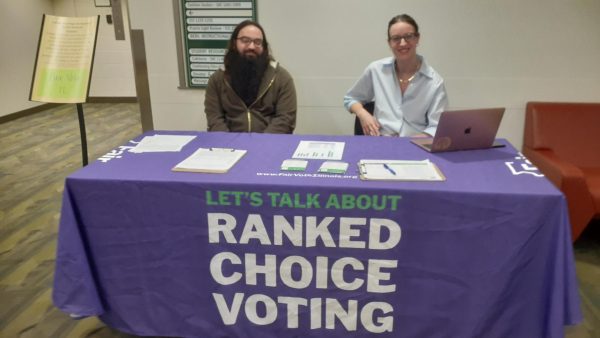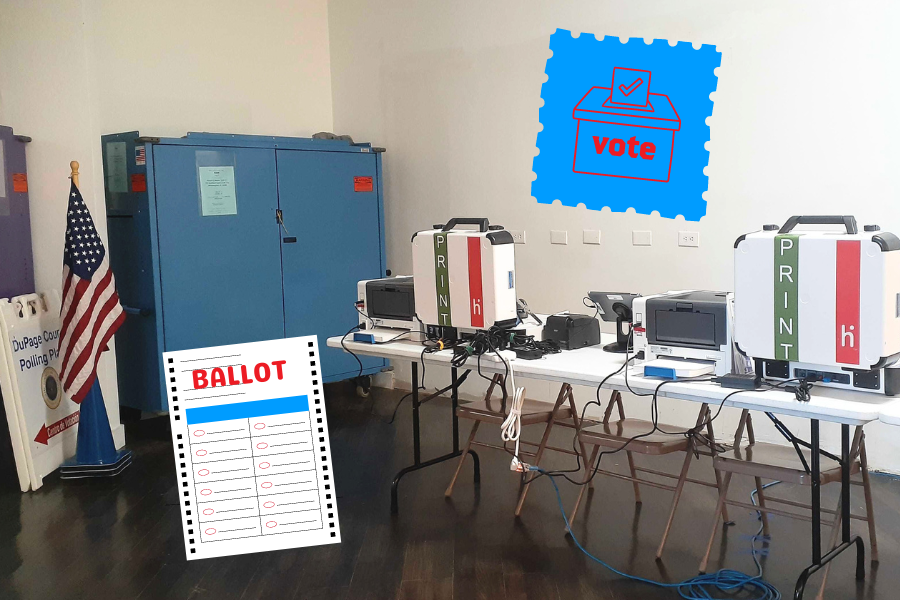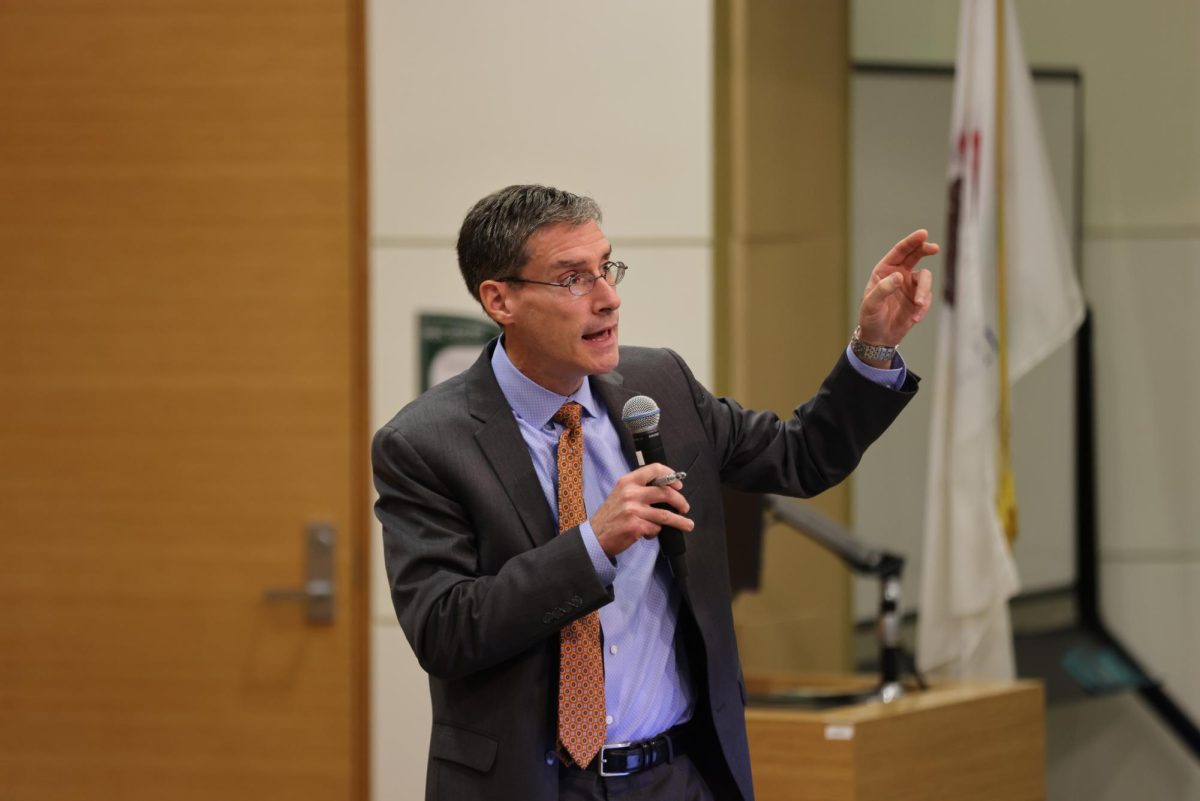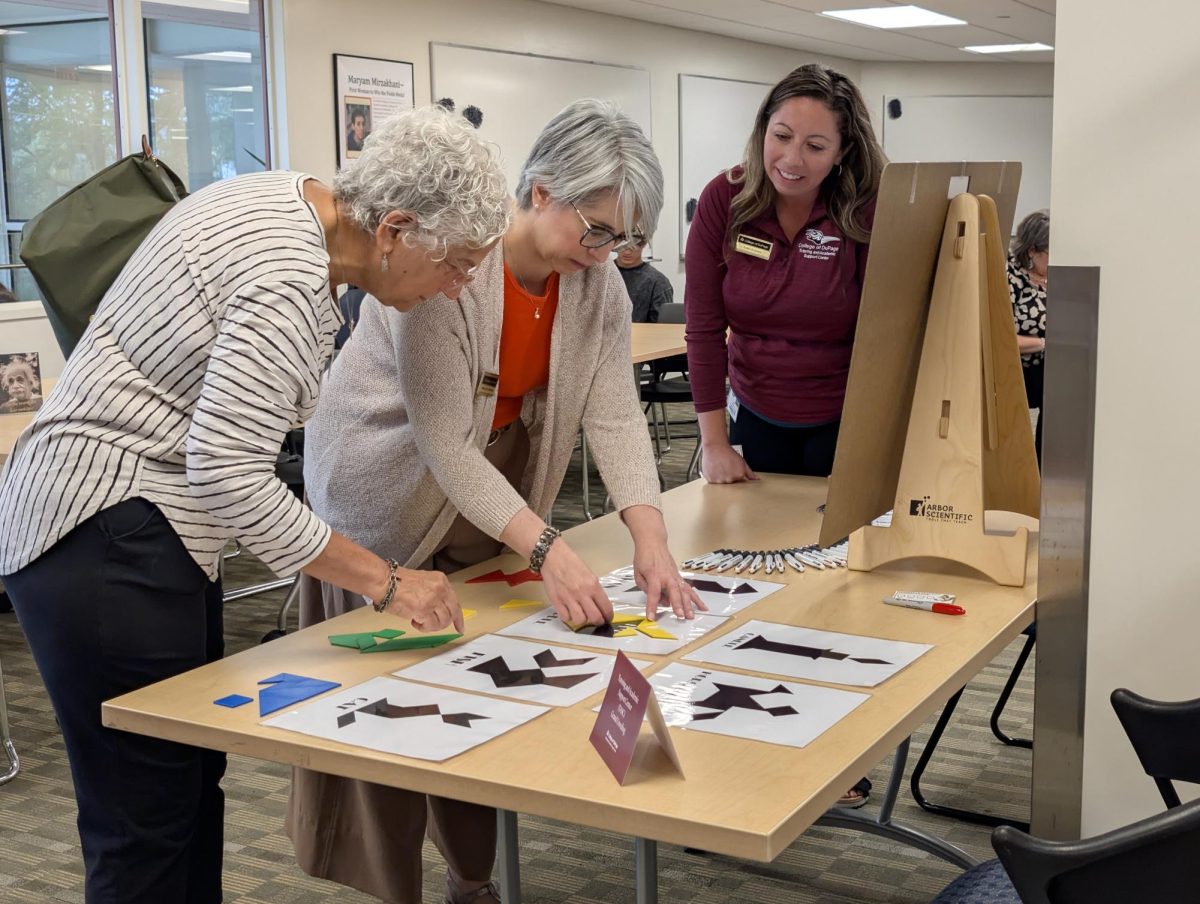Editor’s Note: This article has been edited to add an additional source to the story. COD political science professor Maureen Heffern Ponicki has been quoted to give our readers a more well-rounded view of the topic.
As early voting for the presidential primary elections in DuPage County happens from March 4 to March 18, voter advocacy groups like FairVote Illinois are also working for voting system reform they feel will increase voter engagement and make the voting system more fair.
FairVote Illinois is a non-partisan organization whose objective is to implement rank-choice voting on Illinois ballots for all state and federal elections as well as presidential primaries. They often host informative tables at civic engagement events and college campuses, including COD. Ranked choice voting is a system used in elections with multiple candidates, in which voters can rank their most to least preferred candidates on the ballot.
Rebecca Williams, who is an organizer for FairVote Illinois, explained how ranked choice voting seeks to address problems with two dominant political parties.
“RCV creates an even playing field for third-party candidates,” Williams said. “Our current system is beholden to two parties, and everyone understands this. Voters do not want to waste their vote. Even if they like a third-party candidate most, they usually will not vote for them.”
In a political system often embroiled in Republican versus Democratic politics, empowering candidates of third parties is a solution some Americans seek. This can especially change the landscape for “straight-ticket” voters, who vote for candidates that only belong to a specific party, rather than based on specific policies or qualifications.
This was evident in Alaska’s 2022 midterm election, which utilized ranked choice voting. For the first time in over 50 years, candidates from different parties were elected to federal positions. Alaskan voters elected Republicans to the Senate and state governor seat and a Democrat to the House of Representatives.
“Most RCV use is at the local level with nonpartisan elections, and we do see that candidates tend to focus more on issues and their own qualifications when campaigning,” Williams said.

After the Alaska midterm, a data report titled “Alaska’s Elections Reforms: Voter Perceptions & Experiences” polled the voters across lines of age, gender, race and party alignment. Majority of them said the ranked choice voting system was easy to understand and made them feel their vote mattered more than in previous years.
Alaska and Maine are the only two states that have ranked choice voting for federal and statewide elections. However, many municipal elections across the country utilize ranked choice voting. This includes Evanston, Ill., which was the first city in Illinois to adopt ranked choice voting in 2022.
Currently, FairVote Illinois is focused on the smooth implementation of ranked-choice voting in Evanston’s April 2025 municipal election. They will also begin petition drives in Naperville, Skokie and Oak Park.
“We do know that the use of RCV will make it so Evanston will only have one municipal election in April, making it simple for both voters and candidates,” Williams explained. “They previously had a confusing system that required two elections some years, depending on multiple variables.”
This issue of multiple elections for the same position is described as runoff voting, where people vote between multiple candidates in one election, and then have a second election to vote between the top two candidates. If states switched to ranked-choice voting, no runoff elections would be needed, because voters would already rank their most to least preferred candidate on the original ballot.
Maureen Heffern Ponicki, a political science professor at COD, provided her professional insight into the effectiveness of ranked choice voting. She cited a recent compilation of research titled “Evaluating the Effects of Ranked-Choice Voting” published by New America, which is a liberal think tank organization.
Heffern Ponicki stated that ranked choice voting has created some positive effects, though the gain is not large.
“Some hope that it will better help minority candidates to get elected, but so far the research has not shown that to be true,” Heffern Ponicki said. “But there is evidence that it has a slightly positive impact on voter participation and feelings of representation.”
She also stated there seem to be higher rates of ‘sincere voting’ where constituents vote for the candidate who they see as most fit for the position, not just who they think has the best chance of winning.
It is up to the voters and citizens to decide whether they want to implement ranked choice voting. They must first collect enough signatures through petitions to introduce a proposition on ballots for ranked choice voting. If a majority of voters vote “yes” for the binding referendum, then ranked choice voting will be implemented in the election. If RCV is approved in multiple cities, FairVote Illinois’ hope is the Illinois General Assembly may pass legislation for statewide use.
This year, the Illinois State government created the Ranked-Choice and Voting Systems Task Force to evaluate the lawfulness of alternative voting systems, including ranked choice voting, and how it could be implemented in Illinois by the 2028 presidential primaries. The taskforce met in February.
The taskforce met in February, which was described in a Feb. 16 article titled “Taskforce To Explore Ranked Choice Voting” on the Advantage New website. According to the article, Illinois representatives stated some concerns about how voters may be confused by the new ballot format, especially due to “ballot exhaustion,” an issue where voters don’t fill out a ballot completely if they feel there are too many candidates. These incomplete ballots could lead to people’s votes not being fully counted.
In response, proponents for ranked choice voting state it can be beneficial to increase voters’ overall options, and it reduces partisanship by forcing candidates to campaign on policy, rather than party-based allegiances. The impact this could have on Illinois extends beyond state elections to the presidential election.
In 2024, the main two party candidates, Republican Donald Trump and Democrat Joe Biden, are receiving increasingly lower approval ratings than in years past. Yet, people hesitate to vote for popular third party or independent candidates on the ballot, due to feeling like it will be a waste of their vote.
“The binary choice in our elections is a major factor in driving polarization,” Williams said. “The plurality system, which encourages strategic voting, artificially suppresses third party support.”
If ranked choice voting were implemented, voters could rank all their options, and even if their third party candidates were not in the majority, the voters’ next most popular choice would be valid.
“If RCV were being used in all the states right now for the general election, I believe the main difference we’d see is more people would be considering voting third party, while likely marking Biden or Trump as their second choice,” Williams said.
Heffern Ponicki asserted ranked choice voting is a great first step for improvement that more jurisdictions should adopt, but deeper reforms are needed to solve stagnant political issues.
“The larger problems reside in our single member district (SMD) and a lack of proportional representation, historically high rates of polarization, unregulated money in the electoral system and quite honestly, very low trust in our electoral system despite low rates of voter fraud,” Heffern Ponicki stated.
Political analysts and legislative advisers are seeking research on the mechanisms of ranked choice voting for the places where it has been implemented. For this year’s general presidential election, Alaska and Maine will be implementing the ranked choice voting system. The outcomes may be a good indicator for how third-party support affects the presidential stage.
To learn more about ranked choice voting and local Illinois implementation plans, view the fairvoteillinois.org website or attend FairVote Illinois’ virtual volunteer event on Tuesday, March 5 at 6 p.m.










john Whitmer • Mar 5, 2024 at 11:07 am
It seems much opposition to ranked-choice voting comes from the parties themselves and those with vested interests in party power and control. Not surprising; few groups (or individuals) support anything that reduces their power and control. And political parties are certainly not among those few.
Justin Paglino • Mar 4, 2024 at 7:43 pm
Hear Hear! this is something our country desperately needs. Australia has had RCV for over 100 years and they have multiple parties – no vote splitting, no ‘spoiling,’ no ‘lesser evil’ voting, no ‘throwing away your vote. John Adams warned a division of the republic into 2 great parties would be the ‘greatest political evil under our constitution.’ here we are. RCV is the way out.